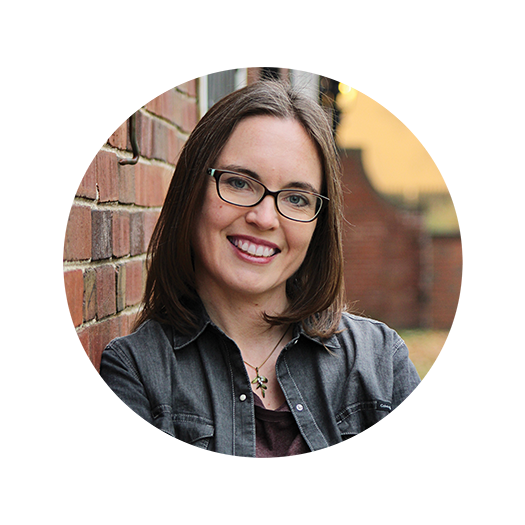Praying for the Woman Who Stole My Home
by Catherine McNiel

Sophia is the Greek word for Wisdom, and Propel Sophia seeks out the voices of truly wise women and asks them to share worked examples of how they express faith in daily life. Pull up a chair at Sophia’s table, won’t you? There’s plenty of space.
LEARN MORE HERE ▸
In the middle of dinner, the phone rang.
My former neighbor Ana cut straight to the chase. “I thought you had already moved?” she asked. I assured her we had. “But the sale hasn’t gone through yet,” she confirmed. Again, I agreed.
“But someone is living in your unit. Did you know that? Did you give them permission?”
No, no we had not.
Fraud Alert
What felt unbelievable became all too real. Over the next forty-eight hours the story fell into place: A woman had typed up a lease with our address and names, forged our signatures, and signed her own using an alias. She called a locksmith, showed them the lease, and had the locks changed.
We were miles away. We didn’t see a thing.
We called the police, who met us at the condo and pounded on the door. She showed them the fraudulent lease.
They left.
We were beside ourselves. She had committed a crime against us. But to protect those who live with unreliable partners (and their children), my local laws state that if you so much as keep a toothbrush in a residence, you cannot be forced to leave without the full eviction process.
The law—commendably protective of the vulnerable—had rendered me unprotected and without recourse.
I was locked in a lose-lose battle with a real but invisible enemy.
Then, finally, the phone rang again: a middle-of-the-night call from the detective. He had broken her alias and discovered criminal charges; the police were on their way to arrest her. We could enter our condo. The eviction process could be expedited. We could proceed with the sale.
We had redemption.
Or did we?
Legally, justice was served. The financial ruin we faced was averted. The law had found a way to restore to us what a criminal had stolen from us.
When Justice Isn’t Enough
But as I stood with the detective in the dark, in the condo, I knew the real injustices had not yet even been identified or addressed. My eyes showed me the home my “enemy” had built for her babies. I saw their stuffed animals, their school assignments, their snacks. I saw the prayer books on her nightstand, each promising financial prosperity for those who pray the right words. I saw the letters she had written and not yet mailed to her abusive ex-husband, the legal papers showing how he had used her. I saw the stack of job applications that now would never be mailed. I saw a dozen little icons of hope, of a living woman, of a mother—and a desperate fight for the safety and health of her children. And I saw a broken, traumatized life unfolding for those children, who themselves would soon be asked to make impossible decisions with far too little invested in them.
Never before or since have I received such a bittersweet gift: an invitation to look upon an enemy and see her life from the inside out, as intimately and vulnerably as she sees herself.
The months following this theft-of-my-house were laden with emotional, legal, and financial weight. But as I prayed again and again for my enemy (Matthew 5:44), I began to see the situation differently. Her crime was her own—but the injustices that created her broken world were not of her own making.
And for those of us who follow Jesus, our mission is to love our neighbors—even strangers and enemies—and work to create a world where God’s will is done, where all God’s children have enough to survive.
To this day, I wrestle with how Jesus would have had me love this enemy of mine, this woman who stole my condo. Looking into the life of my enemy changed me and my understanding of Jesus’ words: “From everyone who has been given much, much will be demanded; and from the one who has been entrusted with much, much more will be asked.” (Luke 12:48) It changed my understanding of what it requires for us to love and pray for our enemies.
There is no happy ending to this story—at least, not that I can see. But I hope and pray and plead with my Creator that she will find peace—and that those of us who are well fed and sheltered now will take our part in creating that peace.
After all, it was to the poor God promised the Kingdom, those who are weary and sad now, those who are hungry and thirsty now.
After all, we worship a God who, while we were still enemies, laid down his life for us and called us his friends.
This story is adapted from Fearing Bravely: Risking Love for Our Neighbors, Strangers, and Enemies by Catherine McNiel. Copyright © 2022. Used by permission of NavPress. All rights reserved.
CATHERINE MCNIEL
Catherine McNiel writes about the creative and redemptive work of God in our real, ordinary lives. She is the author of Fearing Bravely: Risking Love for our Neighbors, Strangers, and Enemies; All Shall Be Well: Awakening to God’s Presence in His Messy, Abundant World; and Long Days of Small Things: Motherhood as a Spiritual Discipline which was an ECPA finalist for New Author. Catherine studies theology while caring for three kids, two jobs, and one enormous garden. She’s on the lookout for wisdom, beauty, and iced coffee. Connect with Catherine at catherinemcniel.com or on Twitter, Facebook, and Instagram.
